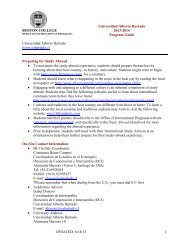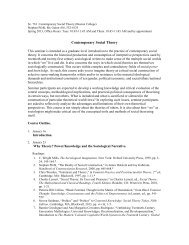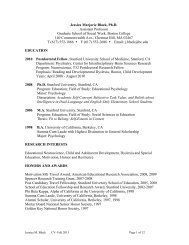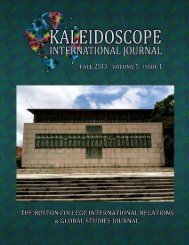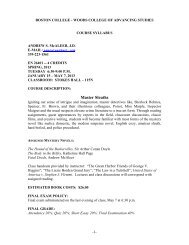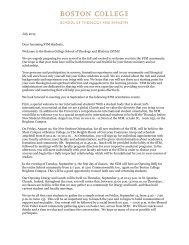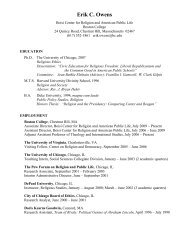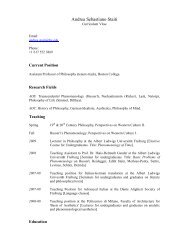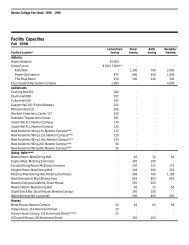separation of powers in thought and practice? - Boston College
separation of powers in thought and practice? - Boston College
separation of powers in thought and practice? - Boston College
Create successful ePaper yourself
Turn your PDF publications into a flip-book with our unique Google optimized e-Paper software.
2013] Separation <strong>of</strong> Powers <strong>in</strong> Thought <strong>and</strong> Practice? 435<br />
must be preceded by an exercise <strong>of</strong> legislative power that lays down a<br />
general rule apply<strong>in</strong>g to everyone, not just X, <strong>and</strong> a judicial proceed<strong>in</strong>g<br />
that makes a determ<strong>in</strong>ation that X’s conduct <strong>in</strong> particular falls with<strong>in</strong><br />
the ambit <strong>of</strong> that rule, <strong>and</strong> so on. Apart from the <strong>in</strong>tegrity <strong>of</strong> each <strong>of</strong><br />
these phases, there is a sense that power is better exercised, or exercised<br />
more respectfully so far as its subjects are concerned, when it proceeds<br />
<strong>in</strong> this orderly sequence. These are prelim<strong>in</strong>ary <strong>thought</strong>s. In what<br />
follows I shall try to make them clearer.<br />
I. Is the Separation <strong>of</strong> Powers a Legal Pr<strong>in</strong>ciple?<br />
In his recent work, Mann<strong>in</strong>g has made a good case for the proposition<br />
that the <strong>separation</strong> <strong>of</strong> <strong>powers</strong> is not a pr<strong>in</strong>ciple <strong>of</strong> the U.S. Constitution.6<br />
The Constitution, says Mann<strong>in</strong>g, “adopts no freest<strong>and</strong><strong>in</strong>g pr<strong>in</strong>ciple<br />
<strong>of</strong> <strong>separation</strong> <strong>of</strong> <strong>powers</strong>. The idea <strong>of</strong> separated <strong>powers</strong> unmistakably lies<br />
beh<strong>in</strong>d the Constitution, but it was not adopted wholesale.”7 (The contrast<br />
here may be between the federal Constitution, which, as Mann<strong>in</strong>g<br />
po<strong>in</strong>ts out, conta<strong>in</strong>s no Separation <strong>of</strong> Powers Clause,8 <strong>and</strong> some <strong>of</strong> the<br />
state constitutions which, at least textually, do.)9<br />
I th<strong>in</strong>k Mann<strong>in</strong>g has made a reasonable case, though I would have<br />
liked to see his argument related more explicitly to Dwork<strong>in</strong>ian methodology:10<br />
whatever it says <strong>in</strong> the constitution, does the best <strong>in</strong>terpretation<br />
<strong>of</strong> the constitution’s provisions require us to embrace this as a<br />
background legal pr<strong>in</strong>ciple? I guess Mann<strong>in</strong>g th<strong>in</strong>ks that this is the view<br />
held by those he calls functionalists, <strong>and</strong> he judges their <strong>in</strong>terpretive<br />
exercise unsuccessful.11<br />
Assum<strong>in</strong>g Mann<strong>in</strong>g is right about the legal <strong>and</strong> constitutional situation,<br />
the <strong>separation</strong> <strong>of</strong> <strong>powers</strong> may rema<strong>in</strong> an important pr<strong>in</strong>ciple <strong>of</strong> our<br />
political theory—<strong>in</strong>deed an important pr<strong>in</strong>ciple <strong>of</strong> the body <strong>of</strong> theory we<br />
6 Mann<strong>in</strong>g, supra note 3, at 1944.<br />
7 Id.<br />
8 Id.<br />
9 See, e.g., Ind. Const. art. III, § 1; Va. Const. art. I, § 5. I say “at least textually” because,<br />
as one scholar has observed, recognition <strong>of</strong> <strong>separation</strong> <strong>of</strong> <strong>powers</strong> <strong>in</strong> the early state<br />
constitutions “‘was verbal merely,’ <strong>and</strong> that <strong>in</strong> <strong>practice</strong> it meant little more than a prohibition<br />
on plurality <strong>of</strong> <strong>of</strong>fice.” M.J.C. Vile, Constitutionalism <strong>and</strong> the Separation <strong>of</strong><br />
Powers 147 (2d ed. 1998) (quot<strong>in</strong>g Edward S. Corw<strong>in</strong>, The Progress <strong>of</strong> Constitutional Theory<br />
Between the Declaration <strong>of</strong> Independence <strong>and</strong> the Meet<strong>in</strong>g <strong>of</strong> the Philadelphia Convention, 30 Am.<br />
Hist. Rev. 511, 514 (1925)).<br />
10 See Ronald Dwork<strong>in</strong>, Law’s Empire 225 (1986) (“Accord<strong>in</strong>g to law as <strong>in</strong>tegrity,<br />
propositions <strong>of</strong> law are true if they figure <strong>in</strong> or follow from the pr<strong>in</strong>ciples <strong>of</strong> justice, fairness,<br />
<strong>and</strong> procedural due process that provide the best constructive <strong>in</strong>terpretation <strong>of</strong> the<br />
community’s legal <strong>practice</strong>.”).<br />
11 See Mann<strong>in</strong>g, supra note 3, at 1945, 1950–58.



